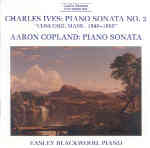Cedille has reissued this coupling of Ives and Copland piano sonatas at mid-price, an idea that hopefully will introduce a new crop of music lovers to a pair of outstanding performances. It’s always interesting to hear what one distinguished composer/performer has to say about his predecessors, and Easley Blackwood proves himself a very knowing and committed advocate. He characterizes the four movements of the Ives, which can sound like a big mess of notes, as well as anyone. Emerson’s declamatory grandeur and eruptive ebullience seldom has been projected with similar boldness, while Blackwood gives witty point to Hawthorne’s riotous collages of thematic fragments. In both of these very demanding movements he manages to keep the thickest textures remarkably clear, and while he never minimizes the music’s spikiness, he never loses track of its inner logic (or at least he makes it sound as though it actually has an inner logic, and that’s saying something).
The Alcotts, the easiest movement to play and grasp, here mingles its customary simplicity with a certain near-disturbing urgency that’s quite affecting. Note how Blackwood underlines the special character of Thoreau through generous use of the pedal, aptly blurring the outlines and subduing the dynamics as Ives requests. This performance includes the optional flute part, ably played by Richard Greaf, though this component never has been especially important to me. If you feel strongly about it, though, it’s here.
The Copland Sonata makes a very interesting and appropriate coupling. It has something of Ives’ declamatory power, and, in its central movement, his pop-based musical syntax–but it’s all expressed with outer as well as inner logic. Hearing one work after the other is sort of like looking at the same piece of property, first covered with random bits of junk (no insult to Ives here), and later landscaped. Once again Blackwood offers an exemplary performance of the piece. He’s particularly impressive in both the skittish second movement, where right and left hands really do seem to operate with complete independence, and in the finale, which is a tough movement to hold together. Extremely lifelike sonics make this recording a highly desirable acquisition for pianophiles and for fans of this alternately austere and extravagant music. [11/19/2004]
































